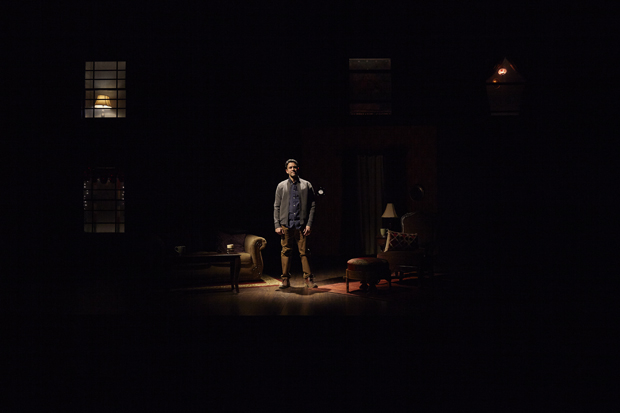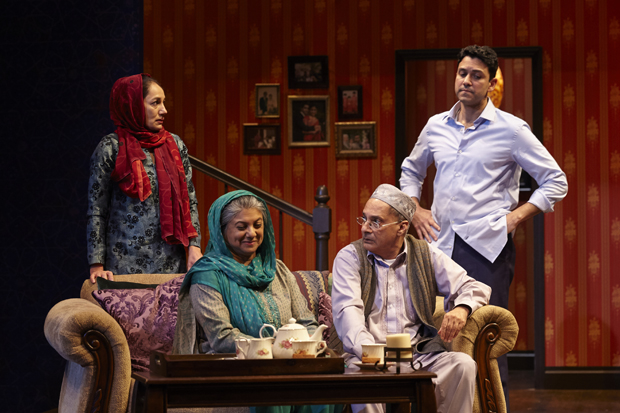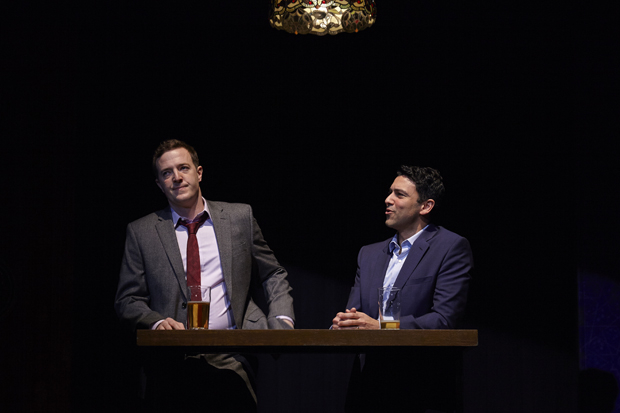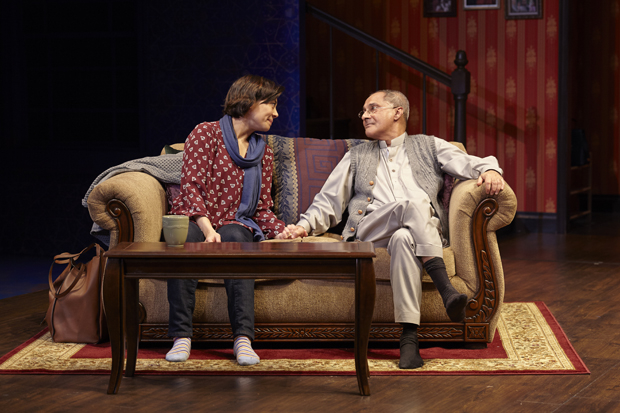An Ordinary Muslim and the Extraordinarily Precarious State of Masculinity

(© Suzi Sadler)
Azeem Bhatti has a chip on his shoulder. You can tell by the way he barks at his wife. It is reflected in the relish with which he rips into a perceived adversary, and his overwhelming self-pity when things don't work out his way. Azeem might seem like an extraordinary jerk, but Hammaad Chaudry carefully reveals why he's that way, and why his self-destructive behavior is all-too-ordinary in An Ordinary Muslim, which is now making its world premiere at New York Theatre Workshop.
The story centers on the Bhattis, a Pakistani-British family. They were originally wealthy landowners in India, but the partition of 1947 left them with a tiny plot in the newly formed Pakistan. Seeing little opportunity there, Akeel (Ranjit Chowdhry) and Malika (Rita Wolf) decided to raise their children in Britain, a choice that seems to have paid off: They now live with their banker son, Azeem (Sanjit De Silva) and his lovely new wife, Saima (Purva Bedi) in West London. Their daughter, Javeria (Angel Desai), has formed a new family in Manchester. Both children are well educated and speak with British accents, but Javeria's return is our first indication that all is not right in this model immigrant family.

(© Suzi Sadler)
Javeria plans to take Akeel with her to Manchester following a physical confrontation between her parents. Azeem expects to be promoted, but suspects that anti-Muslim bias might stand in his way. That's why he strongly discourages Saima from wearing her hijab to work, flatly stating, "In this country, a good Muslim is an invisible Muslim." Azeem seems to be fighting a war on two fronts: He disdains community leaders like Imran Jameel (Harsh Nayyar) and his son, Hamza (Sathya Sridharan), for the "village Islam" they practice; but he also thinks that assimilation is a joke. He's also not sure he should trust any white people, not even his liberal friend, David (Andrew Hovelson), who helped get him the interview for promotion in the first place.
De Silva concentrates Azeem's mounting anger in his ever-tightening lips. As Azeem's personal and professional implosion becomes more complete, his struggle to assert his patriarchal authority becomes increasingly frenetic. As Akeel, Chowdhry serves his fatherly expectations cold, with a dash of bitterness. Wolf's Malika is just as icy, although she reserves a bit of warmth for her male progeny: To Javeria's dismay, she asks about her grandson, but never her granddaughter. Chaudry smartly plants little seeds of conflict throughout his exposition, and with agrarian patience, the cast nurtures them into fruition. By encouraging such nuanced performances, director Jo Bonney expertly cultivates the slow-build nature of Chaudry's script.

(© Suzi Sadler)
An Ordinary Muslim invites comparison to Ayad Akhtar's Disgraced, which also deals with the disillusionment of Pakistanis in the West and the humiliation in which it is rooted. An Ordinary Muslim has none of the gasp-inducing reveals of that earlier play, but that doesn't mean we're not listening as we embed with the Bhattis and discover what really matters to them.
Neil Patel gives us a hint with a set that depicts a comfortable middle-class living room adorned with rugs and cushy, ever-so-slightly Eastern furniture. This room feels small within the shell of a larger room wallpapered with azure tessellations, indicating an Islamic faith that is both ever-present and inaccessible. Susan Hilferty's costumes similarly capture the mixture of cultural values that make up each individual in the play: Javeria tops her active mom ensemble with a tight headscarf, while Akeel wears a grandfatherly British cardigan over his kurta. Azeem, on the other hand, won't be seen in anything remotely Pakistani.
An Ordinary Muslim is a slow climb, but it's worth it once you get to the top and see Chaudry's bird's-eye perspective. He gives us a detailed look at a culture that builds boys up to be little princes and then releases them to an economy that treats them like serfs. He also shows the fallout when those cogs in the capitalist machine try to reassert their traditional authority and are once again humiliated. Reactionary male resentment has become perhaps the most potent political force in a rapidly changing world, so we come to understand Azeem as not just an ordinary Muslim, but an ordinary man in a time that demands the extraordinary. Chaudry leads us to question if that expectation, or really any great expectation, is a good idea.

(© Suzi Sadler)










